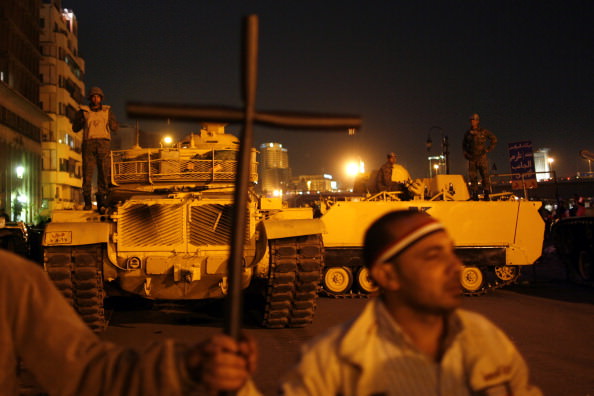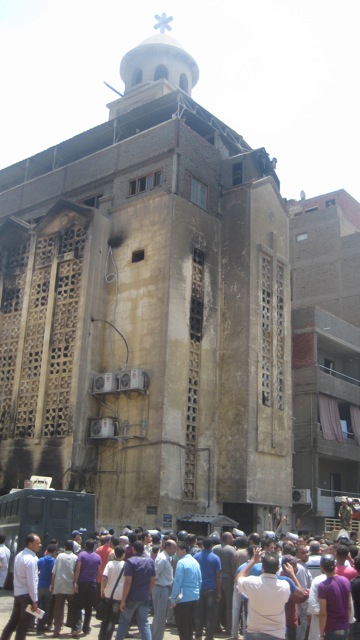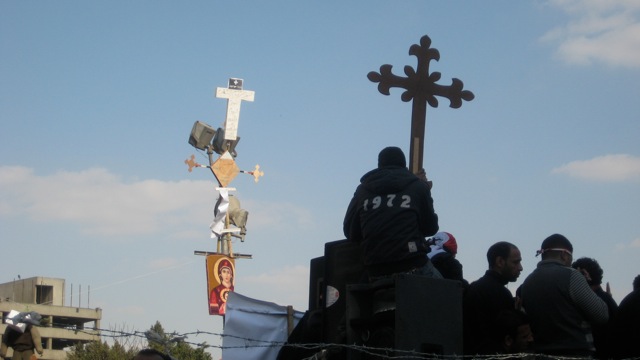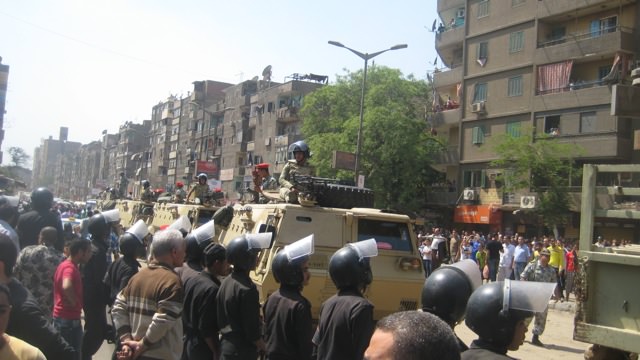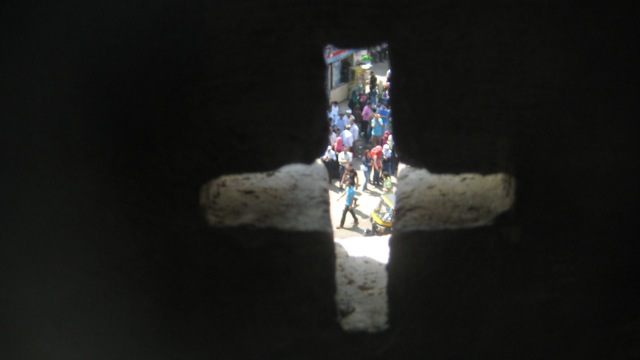On a recent afternoon this month, in a busy downtown Cairo street, armed men exchanged gunfire, threw rocks and Molotov cocktails, and freely wielded knives in broad daylight. The two-hour fight, which began as an attempt by some shop-owners to extort the customers of others, left eighty-nine wounded and many stores destroyed. In the new Egypt, incidents like this are becoming commonplace. On many nights I go to bed to the sound of gunfire, and each morning I leaf through newspapers anticipating more stories of crime. Stopped at gun-point; car stolen; head severed; kidnapped from school, held at ransom; armed men storm police station opening fire and killing four; prison cells unlocked—91 criminals on the loose. Many people I know have already bought guns; on street corners metal bludgeons are being sold for $3; and every week I receive an email, or SMS, or Facebook message about a self-defense course, or purse-size electrocution tool, or new shipments of Mace. “These are dangerous times,” my mother told me recently as she handed me a Chinese-made YT-704 “super high voltage pulse generator.” “You have to take precautions, keep it in your bag.”
Even more worrying, it seems increasingly clear that a variety of groups have been encouraging the violence, in part by rekindling sectarian tensions that had disappeared during the Tahrir Square uprising, when Muslim and Coptic protesters protected one another against Mubarak’s thugs. Since then, there have been a series of attacks on Copts, and the perpetrators seem to include hardline Islamists (often referred to as Salafis), remnants of the former regime, and even, indirectly, some elements of the military now in charge, who have allowed these attacks to play out—all groups that in some way have an interest in disrupting a smooth transition to a freely elected civil government and democratic state.
On the weekend of May 7 and 8, in the Cairo district of Imbaba—an impoverished working-class neighborhood that has been a stronghold of militant Islamists in the past—a group of Salafis tried to force their way into Saint Mina Church, a local Coptic house of worship. They were demanding the release of a woman, Abeer, an alleged convert to Islam whom they claimed—without evidence—the church was holding against her will. (Christians here have long alleged that Islamists kidnap their girls, rape them, and force them to convert to Islam. In recent weeks, those allegations have grown. Now, some Salafis have been making similar charges about Copts.).
The day before, via Twitter, they had called on Muslims to come to the church to “free a Muslim sister,” and on Saturday night, a handful of Salafis and some thugs gathered outside the church, waving sticks and swords, chanting Allahu Akbar (Allah is the Greatest), provoking onlookers. A Christian man pulled out a gun and fired at them from a café nearby, and Christian residents from neighboring buildings followed suit, shooting from balconies. Before long, a battle had begun. The Muslim men and a growing crowd of hooligans brought out Molotov cocktails, rifles, handguns, bludgeons and knives. Eventually, the church was set on fire.
It was several hours before the police, fire department, and army showed up, and even then, witnesses told me, “they just stood by watching.” By the time they began firing tear-gas and dispersing the crowds, the Islamists and their now-large entourage of young men (many of whom were later revealed to be thugs with criminal records) had decided to move on. “They announced they were heading to another church to destroy it,” one eyewitness, a lawyer (and Muslim), told me, “and off they went.” The army just watched them march off, weapons in hand.
At the second Coptic church, also in Imbaba, two kilometers away, the mob wreaked havoc. A video shows a group of several hundred men marching towards it, breaking open its metal door, and smashing everything in sight. One man held a gun. Some were bearded; others young and clean shaven. The two attacks left fifteen people dead (including both Muslims and Copts) and 242 injured—some struck by stray bullets or broken glass, rocks, and wood; others burned in the fire. Many more were nearly comatose from inhaling large amounts of tear gas.
By the time I got to the second church early Sunday morning, it was a scene of devastation. The church priest, Father Metias, sat on a wooden bench in the middle of the burned building consoling sobbing Christians, who kissed his hand. “Even if it wasn’t this woman, Abeer, who they claim was held by the church, they would find another excuse. Before Abeer there was Camilia,” he told me, referring to a similar case in which Salafis claimed that a Coptic woman named Camilia had converted to Islam and was being held in another church. (Camilia eventually appeared on TV refuting the Salafi claims. Abeer, on the other hand, whose whereabouts during the attacks remain unclear, has since handed herself over to the military and is being investigated on several charges.) “These Salafis are radical, they want to eradicate the Copts from the country,” the priest said. “But I hold the army and leaders responsible. There is a security vacuum. Those who commit crimes are not being held accountable.”
Advertisement
By far the largest Christian minority in the Middle East, Egypt’s Copts account for some ten percent of the country’s population of 82 million. Since Mubarak’s resignation on February 11, hardline Salafis —who were kept under tight control by the former regime—have become vocal opponents of the church. Although they command only a small fraction of the followers of the mainstream Muslim Brotherhood, the Salafis’ brand of purist Islam is popular among some in conservative and working class districts, where there is growing resentment that the revolution hasn’t brought any tangible benefits. Leading up to the March constitutional referendum, they promoted “yes” as a vote for “religion and stability,” and they are increasingly turning to the same outreach strategies long-used by the Brotherhood to win supporters. In some areas, Salafi Sheikhs have been using their Friday sermons to incite violence against Copts, whom they regard as infidels, and preach against democracy, which they say is not compatible with their goal of establishing an Islamic State.
The first major attack on the Coptic community occurred on March 4, when armed thugs bulldozed a church to its foundations on the outskirts of Cairo, allegedly over an illicit relationship between a Coptic man and a Muslim woman. The incident was followed by riots and clashes that left 13 people dead and 140 wounded. Yet rather than arresting and charging those responsible—sending them for quick military trials as it increasingly does with peaceful youth protesters—the military simply called on a Salafi Sheikh, Mohamed Hassan, to visit the area and try to reconcile Copts and Muslims.
Outraged by this response, several thousand Copts from across Cairo marched that night to the State TV and Radio Building, ten minutes from Tahrir, and set up camp nearby. They were demanding that the military bring the attackers to justice, rebuild the church, dismiss the district’s governor, and establish a law that insures equal religious protections for Muslims and Copts. Within a day the protest had grown to some 10,000 people, including Muslims who had come out in solidarity. Colored blankets and plywood covered the pavement, and Christian crosses were on display everywhere, as was the symbol of an Egypt for all: the cross within a crescent. “We don’t feel safe in our own country,” one protester told me. He and others I spoke to said they would not go home until their demands were met. “We want to be treated as equals,” Tamer Wagdy, a 25-year-old Copt who decided to act as my guardian, told me. “This is our revolution, the Coptic one.”
Soldiers from the armed forces, with their tanks, guns, and concrete and barbed-wired barricades, had entirely surrounded the hundred-square meters of street where the protesters had gathered. Unlike during the Tahrir uprising, they were doing little to search people entering the area or prevent thugs from infiltrating the crowd. One afternoon, I watched a man rush in, grab a gold chain with a cross on it from the neck of a young protester, pull it off, then push the protester over the corniche fence and into the river and try to run away. He was swiftly shoved to the ground by two teenage boys with crosses tattooed on their wrists and dragged toward a soldier. I then watched as the soldier held the thief’s arm, twisted it, playfully pulled his ear, and then laughed and let him go, back into the crowds. “It’s because we’re Copts,” Tamer had told me. “They are doing nothing to protect us.”
Despite several attempts by the army to disperse them, the Coptic protesters would not budge. Finally, on March 14—the tenth day of their sit-in—the military council promised to meet their key demands. (The army did later rebuild the church, though it has not brought charges against the March 4 attackers.) A priest subsequently urged them to leave and many went home. But ninety or so protestors remained, and the army began a brutal crackdown against them at 4:30 AM that night, sending in several hundred soldiers with wooden sticks, metal batons, and Taser guns. Tamer called me in a panic when the attack began. I couldn’t get to him until 7 AM, when the curfew was lifted. By then, many of his friends had been badly beaten; many had also been detained. Thirty-two people were hospitalized with injuries, and a twenty-two-year old man was missing.
Advertisement
While Christians have long played a significant part in Egypt’s economic and political life—Mubarak’s long-standing minister of finance was a Copt—they have also been subject to recurring waves of persecution. In the 1970s, President Anwar El Sadat attempted to quell the threat of leftist groups by releasing from jail the radical Islamists (or Al-Gamaa Al-Islamiya), who ultimately assassinated him in 1981, and brutal attacks on both foreigners and Copts became more frequent. In the spate of terrorist attacks they orchestrated in the 1990s, Al-Gamaa radicals killed scores of tourists, but also targeted Coptic churches, monasteries, villages, homes, and shops, particularly in Upper Egypt, leaving several hundred dead.
Mubarak, to his credit, clamped down: his security apparatus threw Al-Gamaa members in jail and the situation for Copts improved. Permits to build churches became somewhat easier to obtain, and broadcasts of church services and programs became more frequent. But it was also widely known that the regime was allowing a degree of room for Salafis and more radical Islamists to keep society somewhat fragmented and provide a counterweight to the far larger Muslim Brotherhood, whose social services and broad support made it a more direct threat to the government. Among the diplomatic cables disclosed by Wikileaks, for example, one from 2009 points to the “striking increase” in Salafism in recent years, and reports: “One of the most potent factors in facilitating the spread of Salafism has been the [Government of Egypt’s] largely passive approach to it… the GOE is happy to allow the unfettered spread of Salafi ideology, viewing it as drawing popular support away from the MB [Muslim Brotherhood].” The cable further noted: “Salafism is a bridge to extremism.”
Last year, amid growing grievances against the government and animosity towards the president’s son, Gamal Mubarak—who was being groomed to succeed his father in the 2011 presidential elections—the state security apparatus increasingly resorted to violence. Days before the parliamentary elections in November 2010, clashes broke out in a district near the Pyramids between anti-riot police and Copts, who were protesting a government moratorium on construction of a Christian community center. At least two people were killed, dozens injured, and 133 arrested. The government’s NDP spokesman Ali ElDin Hilal blamed the Copts for inciting the conflict; 156 people faced charges with possible maximum sentences of life in jail.
Then, during the November elections, the Coptic candidates were all but suppressed. The ruling National Democratic Party (NDP) fielded just 10 Copts among its 780 nominees vying for the 508 available seats. Of a total 5,725 candidates running for election, just 81—less than 2 percent—were Christian. It was widely believed that this was another one of the regime’s tactics to silence the opposition and maintain the status quo. (In the end, carefully orchestrated violence, vote rigging and corruption at the hands of the NDP gave it an unprecedented sweeping majority win—the opposition at large was eliminated.)
Weeks later, when a bomb ripped through a church in Alexandria, killing 23 and injuring 81, people were outraged by the regime’s feeble reaction and its changing story about the suspected perpetrators. The rumor fast spread that the Minster of Interior, Habib El Adly—a close Mubarak ally who is now in jail—had planned the attack in collusion with Islamists. “He wanted to keep people distracted so that Gamal could be pushed into power,” prominent politicians and retired army generals told me.
Much of this speculation was confirmed when protesters stormed the State Security headquarters on March 5, retrieving classified files and documents from the former regime—some of them directly implicating the interior minister in the Alexandria attack. Other cables and leaked documents unearthed since the uprising point to close collaboration between the State Security, or Amn Al Dawla, and particular Sheikhs, who were given public offices and positions. Among them was Mohamed Hassan, the prominent Sheikh who had been dispatched by the military to calm tensions after the March 4 attack and who, during the revolution, had called the Tahrir Square protesters “sinners.”
Now that the Mubarak regime has fallen and the military has shown clemency toward Islamists, radical Salafis have been further emboldened, sometimes to the point of taking the law into their own hands. In late March, a group of Salafis in the Upper Egyptian governorate of Qena cut off a teacher’s ear after accusing him of renting an apartment to prostitutes. They have also called for monuments and shrines to be destroyed, alcohol to be banned, and all women to cover their hair or risk being beaten and sprayed with acid. When one such threat circulated by SMS last month, many women chose to stay home the next day.
These incidents have led some in the Egyptian media to say that the Salafis have supplanted the Muslim Brotherhood as the fiend that threatens to turn Egypt into an Islamic state. This is hardly plausible—the military has promised that “Egypt will not become Iran,” and the Muslim Brotherhood, which hosted a joint conference with the Salafis last week, has denounced the violence and the radical interpretations of Islam that in part seem to be driving it. It also isn’t clear whether Salafis are principally responsible for the violence: despite perceptions to the contrary, only 23 of the more than 200 people detained for taking part in the Imbaba attack have been identified by the armed forces as Salafis (others who have been identified appear to be mainly thugs, plus some associates of the former regime).
I emailed my friend Stephane Lacroix, a scholar and expert on Wahabism and Egypt’s Salafi movements, asking for his insight on the recent Salafi resurgence. He confirmed the State Security’s support of certain Sheikhs, and said that some of the Egyptian Islamists appear to be backed by wealthy patrons in Saudi Arabia. About the threat to the Coptic community, he said: “Salafis do have a sectarian rhetoric, but at the same time they are capable of pragmatism… The biggest threat, I believe, is from mutasallifin (those influenced by certain hardline Salafi ideas) who are out of everyone’s control. It is those on the fringes of the movement who are causing the recent troubles.”
Although the news of the church attacks and clashes stunned much of the nation, the Coptic community had already anticipated such an attack. “We leave the house in the morning and are not sure we will return at night. Every day we pray for our lives,” one man told me last Friday at a Coptic rally at the Coptic Orthodox Cathedral in Cairo, the seat of the Coptic Pope, during which Copts called for equal rights and better protection from the state.
On Sunday, May 8, a few hours after a midday mass had been held at an Imbaba church for those killed in the local clashes, about two thousand Copts marched from the Supreme Court in downtown Cairo to the State TV and Radio Building. The march had already been planned before the Imbaba attacks, but now, in their aftermath, it had taken on new meaning. One of the protesters’ loudest chants accused Field Marshall Tantawi—the top army commander—of failing to hold anyone accountable for the attacks: ‘Field Marshal Tantawi why are you silent? Is it because you are a Salafi too?’
In one of Mubarak’s final speeches, he warned that in his absence, there would be “chaos.” Since his resignation, the military council, led by former Mubarak insider Tantawi, has at times appeared to be pushing things precisely in that direction. The police remain largely passive, and soldiers often just stand by, watching crimes unfold. Meanwhile, the military has released long-held Islamist prisoners and lifted restrictions on approximately 3,000 wanted radical Islamists who had been in exile and blacklisted from entering the country. Among those recently released is Abboud El Zomor, a member of the Al-Gamaa Al-Islamiya who was involved in the assassination of Sadat and is calling for an Islamic State. He said—live on Egyptian State TV—that he had no regrets about his involvement in the killing of Sadat. “If he were alive I would do it again.”
El Zomor, who was kept in jail for almost 30 years despite completing the 15-year sentence he was handed down, is one of the radical Islamists mentioned in a diplomatic cable dated November 2008. The cable (08CAIRO2187) details the counter-radicalization efforts and pressures Egyptian State Security has been applying on the Al-Gamaa [GI], saying that if pressure is lifted, “it is likely that some members of GI would return to violent extremism.” It also cited a government source saying that members of the group who have been released from prison “are prone to re-radicalization, and that left to themselves, it is likely that they would do so.”
In the end, there does not seem to be any single explanation for the church attack and the other recent incidents of violence. What is clear is that a confluence of forces—an army seeking the opportunity to consolidate power, remnants of a regime stirring havoc, a cabinet with little authority of its own, radical Islamists aspiring to an Islamic State, and deep-rooted currents of social intolerance that Egypt has long failed to confront—have created a situation in which the Copts, among other groups, have become particularly vulnerable. As the economy plummets, financial woes may lead to more instability—prices have already risen, and on the streets people are complaining they have no work. Reports indicate that many are already resorting to theft to feed their families.
As I write this, there are several hundred Copts camped outside the State TV and Radio building once again. In their tenth day of protest their encampment—which attracts several thousand in the evening hours as the workday ends and the air cools—looks much like it did back in March. Although the interim Interior Minister has said he will work with an “iron fist,” and the Prime Minister announced measures to prevent religious sloganeering, to give permits to build churches and mosques on an equal basis, and to refer those implicated in previous attacks to military courts, the protesters remain fearful.
A Coptic family is right now mourning the death of their 27-year-old son, who was shot over the weekend of May 15 on his way to work. Two other people were killed last weekend in violence at the hands of armed thugs; 60 others were injured. The army has announced it will extend the emergency law until after a President is elected, and already there is speculation that it may postpone the parliamentary elections, citing security concerns. “Whatever way things go, we’ll be under military rule for at least a few years,” a prominent businessman told me yesterday. As another friend put it, “Egypt today: horror movie, Bollywood production.”
Yasmine El Rashidi’s eyewitness account of the 2011 Egyptian revolution, [The
Battle for Egypt] (http://www.amazon.com/The-Battle-for-Egypt-ebook/dp/B004Z20AZE), has just been published by New York Review Books.


